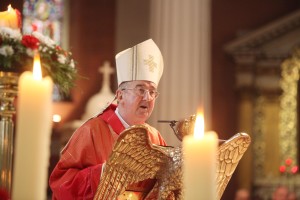
By Sarah Mac Donald - 22 June, 2014
 The Church has yet to discover fully the place of the diaconate within it, Archbishop Diarmuid Martin of Dublin has admitted.
The Church has yet to discover fully the place of the diaconate within it, Archbishop Diarmuid Martin of Dublin has admitted.
He made his comment in a homily at the ordination of three men, Paul Kelly, Timothy Murphy and Eamonn Murray, to the permanent diaconate in St Andrew’s Church on Westland Row, on Saturday evening.
“We pray that you, dear candidates, will help us through the authenticity of your lives and how you exercise your ministry to come to understand better the ministry of the deacon and the ministry of the Church herself,” the Archbishop told the three.
He also underlined that the ordination liturgy was not just a ceremony like a university graduation or conferring.
“The rite of the ordination of the deacon is fully inserted into the liturgy of Eucharist and it is the Eucharist which sets out the path along which the deacon’s life must be conformed to Jesus Christ.”
He reminded the deacons that the concept of service must mark every aspect of their ministry.
“You must minister at the altar with humility. You must act as servants of the liturgy and never its master. The liturgical rite of your ordination calls you to: ‘unassuming authority, self discipline and holiness of life’,” he said.
The Archbishop, who has often spoken out about the level of violence in Irish society, observed that there are “so many today who live in the wilderness of confusion about life and … end up … being more deeply trapped in the wilderness of addiction or violence or greed or simple empty vanity.”
He continued, “There are many who find themselves in the waterless places of a constant seeking for hope and meaning and yet remain trapped in the superficiality of life.”
The diaconate is not an honour or an assignment. It is a call to witness to an essential dimension of the Church and of the Christian life: the call to service, the Archbishop said.
“The temptation for all of us believers is to construct a god who suits our own ideas, whether it be the god of the comfort zone who shields us from engaging with the realities of life or the god of authority who urges us to impose our god on others, either by force or by self-righteousness.”
“The Church is not ours to construct, but it is ours to receive from the Spirit. The one called to service in the Church never serves in his own name,” he concluded.